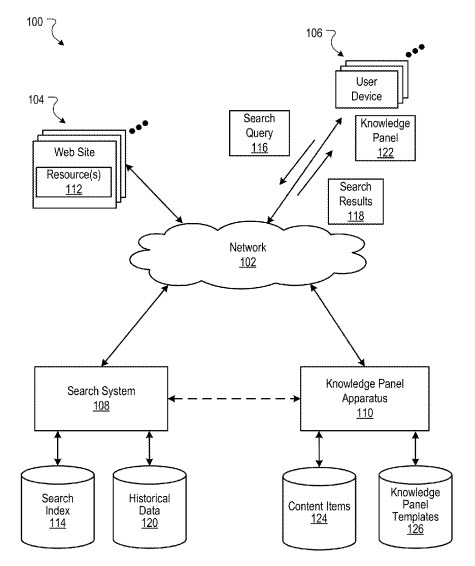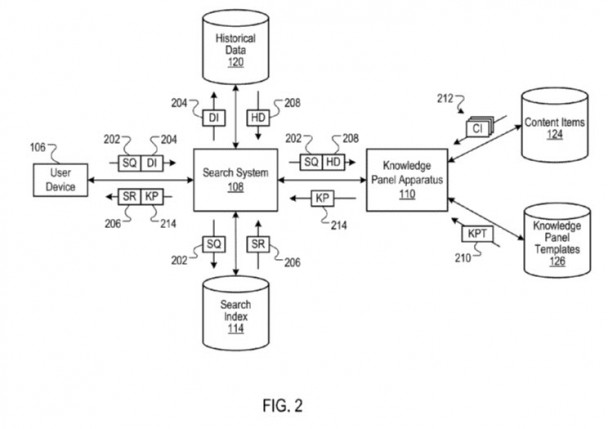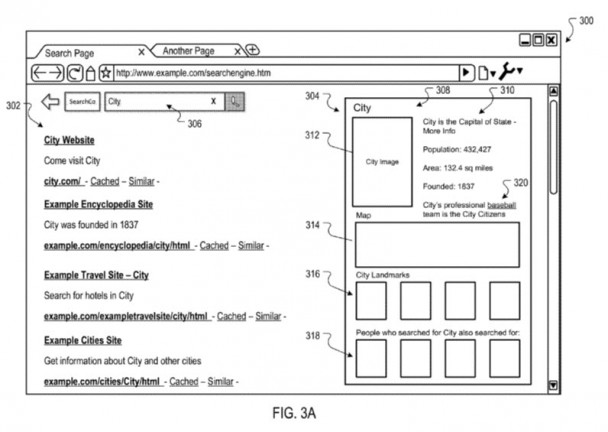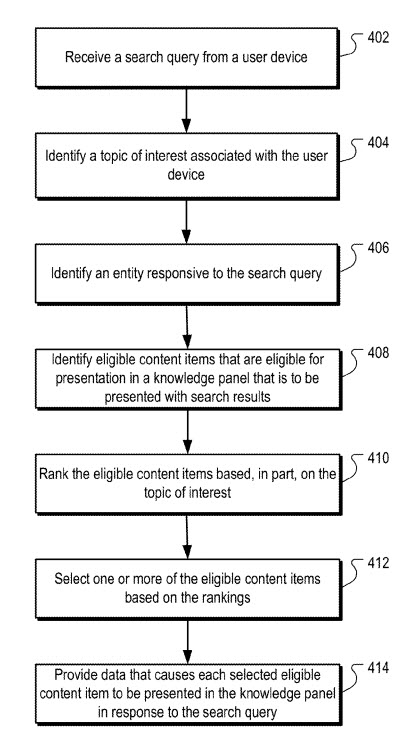Table of Contents
A Google patent application published last month describes how the search results returned in response to a query might show a knowledge panel based upon an entity described in the query, and also may customize the content shown in that knowledge panel when returned, in a way that is based upon the interests of the searcher.
So, let’s say that someone searches for information about a specific entity, such as a city that they are visiting. They might initiate a search for that city and select pages from lists of search results determined to be relevant to the city.
Related Content:
Customized Content in Knowledge Panels
So, this patent aims to describe a process that makes things easier for searchers by having customized content provided to searchers in knowledge panels shown to them.

A look at the knowledge eco-system at Google
This process may involve the following steps. It may:
1) Identify, based on historical data describing user interactions for the search device, a topic of interest associated with a user of the search device (the interests of the searcher are captured that way);
2) identify an entity responsive to the search;
3) Identify several content items eligible to be presented in a knowledge panel, along with search results URLs responsive to the input.
4) Select eligible content items based on rankings; and
5) Return data from each selected eligible content item to be presented in the knowledge panel in response to the search.

How Historic Data and Search Data may be used to determine content shown in a knowledge panel.
Ranking of Customized Content in Knowledge Panels
The content items may be ranked based upon
1) Implicit user indications identified in the historical data, an interest score that indicates a strength of the user’s interest in the topic of interest relative to a strength of the user’s interest in a different topic;
2) Explicit user indications identified in the historical data, a confidence score that indicates confidence that the user is interested in the identified topic of interest;
3) A resource score that indicates the importance of content included in the eligible content; and
4) Ranking the eligible content items based on the interest score, confidence score, and resource scores.
Advantages under the patent
(1) A knowledge panel provided with search results displays information customized based on the user.
(2) The customized information displayed in a knowledge panel may satisfy the user’s search needs without requiring the user to browse through search results.
(3) The information displayed is customized to the searching user device, which may also help satisfy the user’s informational needs. For example, a user is provided with information relevant to the entity the user was searching for, as well as information that is particularly of interest to the user.
(4) By presenting connections between the displayed information and what a user may already know, the displayed information puts the content into a user-specific context, facilitating user internalization of new information. Also, a user may discover or learn information that is of interest without having actively searched for specific information, improving the user’s search, learning, and information discovery experience.
The patent is:
Providing Customized Content in Knowledge Panels
Inventors: Zoltan Stekkelpak, Gyula Simonyi
Assigned to Google
US Patent Application 20150169701
Published June 18, 2015
Filed: January 25, 2013
Abstract
Methods, systems, and apparatus for providing customized content in knowledge panels.
In one aspect, a method includes receiving input from a user device; identifying, based on historical data describing user interactions for the user device, a topic of interest; identifying an entity responsive to the input; identifying eligible content items that are eligible for presentation in a knowledge panel that is to be presented with results responsive to the input, wherein at least one eligible content item is obtained from a first resource and at least one-second eligible content item is obtained from a second resource; ranking the eligible content items based, in part, on the topic of interest; selecting one or more of the eligible content items based on the rankings; and providing, to the user device, data that causes each selected eligible content item to be presented in the knowledge panel in response to the input.
Content is Customized Based upon Historic Searches from the Device being Searched Upon
Someone performs a search and receives a knowledge panel in response. Knowledge panels may provide information or other content about particular entities that have been determined to be relevant to a query. The patent tells us that example entities can include a person, place, country, landmark, animal, historical event, organization, business, sports team, sporting event, movie, song, album, game, and work of art. The content within the knowledge panel may be selected based on one or more topics of interest that are “associated with the user device that issues the search query.”
As an example, the searcher might look for “Atlanta” and an interest determined for the user of the user device, the search engine identifies “baseball” as a topic of interest. “Atlanta,” is identified by the search engine as a factual entity–e.g., a city–and the search engine shows a knowledge panel associated with “Atlanta.”
Content items eligible to be presented in the knowledge panel are chosen and can include snippets of content taken from resources available over the Web. Examples of those resources could include “travel websites, news articles, images, informational pages, and other resources relevant to the factual entity that corresponds to the knowledge panel–e.g., Atlanta.” The content items shown might be ranked based upon the identified topic of interest–e.g., “baseball.” so, any content items that are related to baseball will have their rankings increased relative to content items that are not related to baseball.
So, the search engine might choose to show “an image of Atlanta’s skyline, the weather forecast for Atlanta, and news related to Atlanta’s professional baseball team for display in the knowledge panel for Atlanta.” So, in this example, the searcher is shown a knowledge panel that includes information related to the query, “Atlanta,” along with information related to the user’s interest in baseball.
This approach may be used with information discovery engines that don’t require a search query input, or even explicit user input (sounds something like Google Now). These might be “pushed,” and could be based on artificial intelligence predictions of informational need that may be based on, “a date, time, and/or location of the user device and historical interactions with the user device and/or historical interactions of other user devices at a similar date, time, and/or location.”
This customized content may be ranked based, in part upon one or more topics of interest associated with the requesting user device. So the user of a device may be interested in baseball, skiing, and travel. So, content items related to baseball, skiing, and travel may have their rankings or rank scores increased as a result of that particular interest to the user of the device.
A content item that specifies an upcoming professional baseball game in Atlanta may have its rank score increased relative to the rank scores of upcoming events in Atlanta that are unrelated to the topics of interest for the requesting user device
How Content Items are Ranked Differently
Rankings of content items could be based upon the following:
- An interest score
- A confidence score
- A resource score
The interest score – indicates the searcher’s strength of interest in a topic of interest, it is based upon and it is determined based on implicit user indications identified from historical data (how often the searcher visits certain sites or pages related to that optic, and how often they comment on microblog posts related to the topic.
The confidence score is an indication of the level of confidence that a searcher is interested in a particular topic, again based upon indications identified in the historical data. A user’s explicit indication that they are interested in a specific topic would count highly, as would a daily visit to a particular baseball site or travel site.
A resource score indicates the importance of content from a particular content item concerning the resource from which the content item was obtained. A content item that is an image may be considered highly important it was to the page where it is from (only image on the page, from the center of that page, or the top of the page, and it covers a large portion of that page. The importance of text from a resource may be involved in “how the text relates, semantically, one or more topics associated with the resource from which it was taken.”
This combination of interest score, confidence score, and resource score can be combined to rank content items that might be shown in knowledge panels based upon a searcher’s interest.
Notification of Customization Possible
The patent tells us that it might include information about interests, or a chance for a searcher to confirm or deny such an interest in a particular topic or information format, such as a prompt such as:
“Some of the information provided is based on your interest in baseball. Are you interested in baseball?–Yes/No.”
I remember when Google was offering customized search results like this, with similar prompts informing viewers that the results they were seeing were customized based upon earlier search history. I can’t say I’ve seen knowledge panels that warn about doing this, yet.
So the content that different people may see in knowledge panels may change from one to another, based upon search histories. Interesting that the patent mentions predictive results, like those found in Google Now, too.
Search News Straight To Your Inbox
*Required
Join thousands of marketers to get the best search news in under 5 minutes. Get resources, tips and more with The Splash newsletter:

